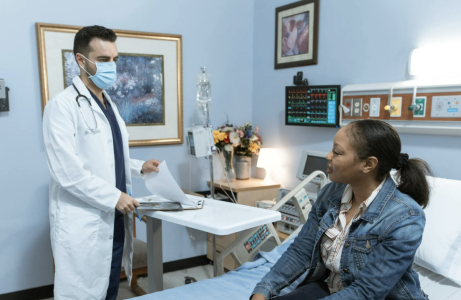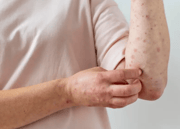Are false health claims putting your care at risk? What new research reveals
By
Veronica E.
- Replies 0
Have you ever left the doctor’s office more uncertain than when you arrived, wondering if what you read online matches what you just heard?
You’re not alone—and doctors are feeling the strain too.
A new national survey from the Physicians Foundation found that misinformation isn’t just floating around on social media—it’s showing up directly in exam rooms, complicating care.
Physicians say this growing wave of confusion is making it harder to provide safe, effective treatment.
As the lines blur between fact and fiction, both doctors and patients are searching for ways to rebuild trust in reliable health information.

The survey polled more than 1,000 physicians across primary care, specialty practices, urban hospitals, and rural clinics.
An overwhelming 61% said they regularly see patients influenced by false or misleading health claims.
Even more concerning, 86% said the problem has worsened in the past five years, with nearly half describing it as significantly worse.
Doctors say the COVID-19 pandemic fueled a flood of misinformation, but the problem extends far beyond it.
Everything from vaccines to supplements, diets, and supposed “miracle cures” now enters conversations during patient visits.
Over half of physicians (57%) believe misinformation is directly interfering with their ability to provide quality care.
Dr. Gary Price, president of the Physicians Foundation, described the toll: “It’s frustrating. It’s demoralizing. It cuts to the core of what motivates most physicians, and that’s a desire to help people in the most fundamental of ways.”
One example he shared involved a patient who canceled a needed surgery because they refused to undergo a COVID test, convinced by claims that minimized the virus’s seriousness.
Doctors say these encounters are draining and increase burnout across the profession.
The internet and social media are obvious sources, but they’re not the only ones.
Public figures and officials have also spread misleading health messages, adding to the confusion.
False claims range from debunked myths about vaccines and autism to unproven miracle treatments for chronic conditions.
A KFF poll recently found that 63% of US adults had heard the false claim linking the measles vaccine to autism, showing how deeply these ideas can take root.
Medical misinformation doesn’t stay theoretical—it can lead to tragic outcomes.
The survey noted how vaccine myths spread widely online, influencing attitudes and even contributing to violent incidents, such as the recent shooting at the CDC headquarters in Atlanta.
Dr. Seema Yasmin of Stanford University, who studies misinformation, pointed out that even healthcare providers can fall for false claims.
“Sadly, sometimes our colleagues fall for the falsehoods, too,” she said, stressing that no one is completely immune.
Doctors are limited by short appointment times, often lasting only eight to twelve minutes.
Addressing deeply held beliefs in that window is nearly impossible.
Dr. Yasmin explained, “It’s too much to expect a physician or nurse practitioner to address complex, deep-seated beliefs in an eight-to-twelve minute consult.”
Physicians are left balancing the need to correct misinformation with maintaining patient trust—a delicate process that takes time and patience.

Experts say one solution is for doctors to meet patients where they are: online.
Dr. Price argues that the medical profession needs to become more visible on social platforms, not only posting studies but also presenting accurate information in ways that are engaging and easy to understand.
This shift calls for both professional training and public awareness campaigns, aimed at helping people navigate an overwhelming flood of content.
You don’t need a medical degree to be a careful consumer of health information.
Here are some steps you can take:
Medical misinformation is unlikely to disappear, but awareness is the first step in protecting yourself and those you care about.
By questioning sources, talking with your doctor, and sharing responsibly, you can help limit the spread of harmful claims.
Read next: The online "doctor" you’re watching might not be real

Have you ever run into health misinformation—online, from friends, or elsewhere? How did you respond, and what strategies do you use to separate fact from fiction? Share your thoughts below to help others stay informed!
You’re not alone—and doctors are feeling the strain too.
A new national survey from the Physicians Foundation found that misinformation isn’t just floating around on social media—it’s showing up directly in exam rooms, complicating care.
Physicians say this growing wave of confusion is making it harder to provide safe, effective treatment.
As the lines blur between fact and fiction, both doctors and patients are searching for ways to rebuild trust in reliable health information.

Doctors say misinformation is making it harder to provide safe, effective care for patients. Image Source: Pexels / Pixabay.
Doctors are encountering misinformation daily
The survey polled more than 1,000 physicians across primary care, specialty practices, urban hospitals, and rural clinics.
An overwhelming 61% said they regularly see patients influenced by false or misleading health claims.
Even more concerning, 86% said the problem has worsened in the past five years, with nearly half describing it as significantly worse.
Doctors say the COVID-19 pandemic fueled a flood of misinformation, but the problem extends far beyond it.
Everything from vaccines to supplements, diets, and supposed “miracle cures” now enters conversations during patient visits.
Also read: Is health anxiety taking over your life? Find out with a quick quiz
The impact on patient care
Over half of physicians (57%) believe misinformation is directly interfering with their ability to provide quality care.
Dr. Gary Price, president of the Physicians Foundation, described the toll: “It’s frustrating. It’s demoralizing. It cuts to the core of what motivates most physicians, and that’s a desire to help people in the most fundamental of ways.”
One example he shared involved a patient who canceled a needed surgery because they refused to undergo a COVID test, convinced by claims that minimized the virus’s seriousness.
Doctors say these encounters are draining and increase burnout across the profession.
Also read: An 'Expert' Claims These Common Health Procedures Put Your Health at Risk—Here’s the Truth Behind Mammograms and Colonoscopies
Where the falsehoods originate
The internet and social media are obvious sources, but they’re not the only ones.
Public figures and officials have also spread misleading health messages, adding to the confusion.
False claims range from debunked myths about vaccines and autism to unproven miracle treatments for chronic conditions.
A KFF poll recently found that 63% of US adults had heard the false claim linking the measles vaccine to autism, showing how deeply these ideas can take root.
Also read: HPV “cures” you can do at home? The truth behind these online “remedies” revealed!
Real consequences for real people
Medical misinformation doesn’t stay theoretical—it can lead to tragic outcomes.
The survey noted how vaccine myths spread widely online, influencing attitudes and even contributing to violent incidents, such as the recent shooting at the CDC headquarters in Atlanta.
Dr. Seema Yasmin of Stanford University, who studies misinformation, pointed out that even healthcare providers can fall for false claims.
“Sadly, sometimes our colleagues fall for the falsehoods, too,” she said, stressing that no one is completely immune.
Also read: Outsmarting misinformation: A simple conversational trick that really works
Why correcting misinformation is difficult
Doctors are limited by short appointment times, often lasting only eight to twelve minutes.
Addressing deeply held beliefs in that window is nearly impossible.
Dr. Yasmin explained, “It’s too much to expect a physician or nurse practitioner to address complex, deep-seated beliefs in an eight-to-twelve minute consult.”
Physicians are left balancing the need to correct misinformation with maintaining patient trust—a delicate process that takes time and patience.

Short appointments make it difficult for doctors to fully address deeply held health beliefs during a single visit. Image Source: Pexels / RDNE Stock project.
Also read: The truth about Medicaid cuts and the misinformation spreading online
What can be done
Experts say one solution is for doctors to meet patients where they are: online.
Dr. Price argues that the medical profession needs to become more visible on social platforms, not only posting studies but also presenting accurate information in ways that are engaging and easy to understand.
This shift calls for both professional training and public awareness campaigns, aimed at helping people navigate an overwhelming flood of content.
Also read: Is everything on social media true? Think again–uncover the reality with Meta’s recent reduction
How you can protect yourself and loved ones
You don’t need a medical degree to be a careful consumer of health information.
Here are some steps you can take:
- Check the source – Trust information from respected medical organizations, universities, and government agencies.
- Ask your doctor – If something seems off, bring it up with a healthcare provider you trust.
- Look for consensus – Reliable guidance usually comes from multiple studies, not just a single report or anecdote.
- Be cautious of quick fixes – Miracle cures and detoxes are almost always misleading.
- Think before sharing – Double-check accuracy before forwarding articles or posts to friends and family.
Medical misinformation is unlikely to disappear, but awareness is the first step in protecting yourself and those you care about.
By questioning sources, talking with your doctor, and sharing responsibly, you can help limit the spread of harmful claims.
Read next: The online "doctor" you’re watching might not be real
Key Takeaways
- A new Physicians Foundation survey of over 1,000 doctors found that 61% regularly encounter patients influenced by medical misinformation, with 86% saying the issue has worsened in the past five years.
- More than half of doctors (57%) report that misinformation interferes with providing quality care, often leading to frustration and burnout.
- False claims spread online, through social media, and even from public figures, making it harder for patients to know what to trust.
- Experts urge both medical professionals and the public to improve communication, awareness, and critical thinking around health information.
Have you ever run into health misinformation—online, from friends, or elsewhere? How did you respond, and what strategies do you use to separate fact from fiction? Share your thoughts below to help others stay informed!






